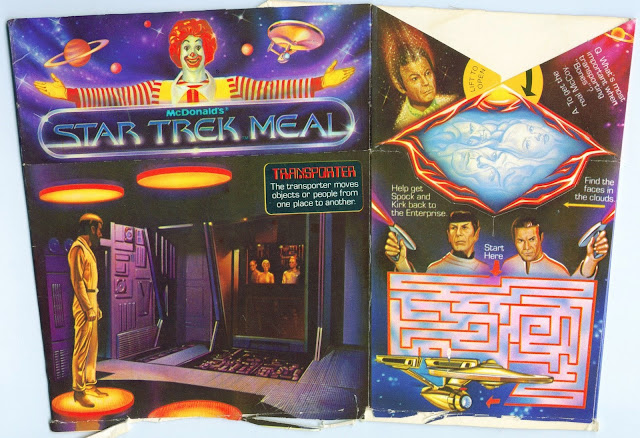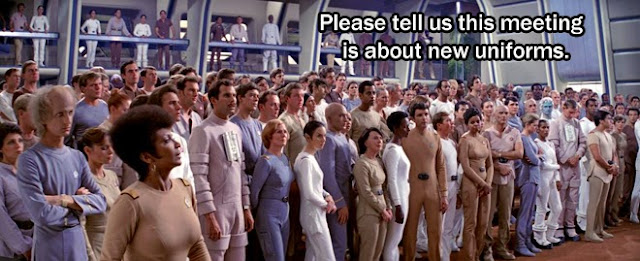 |
| (Photo source: My Star Trek Scrapbook) |
The two Star Trek fans want to find out which older Trek episodes stand the test of time, especially in the age of both the antihero on cable and more sophisticated sci-fi shows like former Deep Space Nine writer Ronald D. Moore's Battlestar Galactica, former DS9 writer Ira Steven Behr's much-missed creation Alphas and the current BBC America hit Orphan Black. Anyone who either currently writes for TV or is, like me, considering transitioning to that kind of career ought to listen to Mission Log. The audience gets to learn a lot from Ray and Champion about the things episodic TV from any era does effectively and the things episodic TV--especially TV in the '60s, long before the game-changing, novelistic Hill Street Blues or Game of Thrones--didn't do so effectively. For instance, if the '60s Trek were made for TV today, Edith Keeler's death at the end of "The City on the Edge of Forever" would have deeply affected Kirk's character for the rest of the series, and exploring his grief and guilt over Edith's death would have been a much better move than how the '60s Trek handled her death afterward, and that was to oddly brush Edith aside and completely forget about her as if she were yet another dead Cartwright bride.
Ray and Champion have reached the '80s Trek feature films by this point, and after they did their analysis of Robert Wise's Star Trek: The Motion Picture last week (Ray doesn't think the 1979 film stands the test of time, while Champion thinks it still does), a Mission Log listener from Norcross, Georgia named Alex Bales posted on the podcast's Facebook wall a fan-made TMP trailer he produced. Unless it's made by the people behind the Screen Junkies channel's Honest Trailers series or Ivan Guerrero, I don't care for fan-made movie trailers, but Bales' trailer is a rare fan-made trailer I actually like--and even more so than the 1979 film itself.
TMP is a mixed bag of a film. It's a rehash of concepts from both the 1967 Trek episode "The Changeling" and 2001: A Space Odyssey that were better executed in those '60s productions. TMP ripped off 2001's "evolution into a superior life form" finale (the film even recruited 2001 visual FX genius Douglas Trumbull, who was also involved with Close Encounters, a smash hit that, along with the success of Star Wars, spurred Paramount to rush a Trek feature film into production). I get that Wise and Gene Roddenberry wanted to make the last great old-fashioned space epic (TMP was one of the last Hollywood epics that opened with an overture before flashing the studio logo), and while I kind of appreciate how TMP chose to emulate the contemplative and moody 2001 instead of the then-frequently duplicated Star Wars, plopping crowd-pleasing heroes like Kirk and Spock and quippy secondary characters like McCoy and Scotty into the clinical tone of 2001 is like asking Kendrick Lamar to rhyme over polka music. It's not going to work.
We want to see Kirk, Spock and McCoy wittily sniping at each other and debating over serious ethical dilemmas or fighting their way out of trouble like they frequently did on the '60s show (and would later frequently do in Nicholas Meyer's superior Trek films). We don't want to see them gawking silently for 15 minutes at pothead-friendly laser light show FX. Even Wise's previous '70s sci-fi procedural, the equally clinically toned but much superior Andromeda Strain, had more humor and personality than this film, McCoy snarking about Spock being "warm and sociable as ever" aside.
 Scottish Daily Dot writer Gavia Baker-Whitelaw runs Hello, Tailor!, a blog that analyzes costume design in geek-friendly movies ranging from TMP to the Marvel Cinematic Universe blockbusters, and in a biting Hello, Tailor! critique of TMP costume designer Robert Fletcher's ugly Starfleet uniform redesigns that's a must-read, she summed up TMP best. She called it "a three-hour screensaver interspersed with shots of William Shatner emoting into the middle distance."
Scottish Daily Dot writer Gavia Baker-Whitelaw runs Hello, Tailor!, a blog that analyzes costume design in geek-friendly movies ranging from TMP to the Marvel Cinematic Universe blockbusters, and in a biting Hello, Tailor! critique of TMP costume designer Robert Fletcher's ugly Starfleet uniform redesigns that's a must-read, she summed up TMP best. She called it "a three-hour screensaver interspersed with shots of William Shatner emoting into the middle distance."Watching Bales' well-edited fan-made trailer made me notice that Paramount and whatever trailer house it hired in 1979 had no idea how to work around the weak material of this three-hour screensaver and market the film effectively, as evidenced in its Orson Welles-narrated teaser trailer and final trailer. Sure, the film wasn't finished and Jerry Goldsmith's incredible score--the strongest element of TMP--hadn't been recorded yet when the trailer house worked on the teaser, so they didn't have much footage to choose from. But aside from that still-amazing-looking model of the refitted Enterprise in drydock, they chose the least interesting footage--and the least enticing score music, some atonal, THX Deep Note-style synth piece.
Good God, Lemon, the Irwin Allen disaster flick music and the synth church organ cue in the final trailer are even worse than the THX Flat Note. And the announcer who's not Charles Foster Kane is the worst announcer in an illustrious history of Trek trailer and promo announcers that's included Welles, Hal Douglas, Christopher Plummer, Ernie "The Loooove Boat" Anderson, Don LaFontaine and Phil Terrence. The announcer in the final trailer has all the gravitas of Derek from Teenagers from Outer Space. I think maybe it is actually Derek from Teenagers from Outer Space.
It's too bad Goldsmith's score wasn't completed at the time because that would have helped the dully narrated final trailer immensely, like how "Leaving Drydock" and "Ilia's Theme" added so much awe to TMP's Welles-narrated TV spots, which were a vast improvement over the two trailers (and were remastered in 2012 by TMP "Director's Edition" visual FX supervisor Daren R. Dochterman, which explains why these TV spots from 1979 look as good as Betsy Russell and Marisa Tomei). Despite the appropriate gravitas of Welles during the teaser, neither trailer would make me want to watch the film, whereas Bales' trailer does.
What Bales gets right that the 1979 trailer house behind the two trailers didn't is emotionally involving the viewers. He accomplishes that by 1) using "What Do You See?," a powerful--without being overbearing--John Murphy score cue from a sci-fi film I haven't seen yet (and I'm kicking myself for not having seen it), Danny Boyle's Sunshine; 2) choosing the perfect clips to go with the Murphy score cue; and 3) focusing on the best and most dramatically satisfying part of TMP's otherwise derivative and uninvolving story (and it's dramatically satisfying only during the "Director's Edition" that was assembled for DVD in 2001 and, unfortunately, hasn't been remastered for Blu-ray). That part would have to be Spock's lifelong inner conflict over his biracial heritage and his search for some sort of meaning in his life, which mirrors the V'Ger entity's search for its creator (Spock's arc also contains my favorite sequence in the film and the one lengthy V'Ger FX sequence that works, the genuinely gripping "Spock walk" sequence). Bales' trailer embodies the emotional depth that Baker-Whitelaw said was what "made the original Star Trek series so compelling" and was too absent for her tastes during TMP.
Is it me or does late '70s movie trailer making just really suck, 1979 Alien teaser trailers aside? The cluelessness of Paramount and TMP's trailer house reminds me of Warner Bros. Family Entertainment's cluelessness when they had to market Batman: Mask of the Phantasm, an above-average 1993 animated film that was understandably difficult to market because it was too adult for kids and too kiddie for adults who were immune to the pleasures of Batman: The Animated Series. But instead of rolling up their sleeves and pulling a Don Draper/Peggy Olson all-nighter to tackle this marketing dilemma, WBFE's ad department came up with the laziest written copy for a Batman movie marketing campaign ever: "America's most exciting and legendary motion picture hero comes to the screen like you've never seen him before, in an all-new, larger-than-life feature film." Why so tedious?
 |
| (Photo source: The Propstop) |
There currently aren't any cues from Goldsmith's TMP score in rotation during "AFOS Prime" and "Hall H" on AFOS, but cues from three other Trek films and the '60s series are in rotation, including the national anthem of Decapod 10.

No comments:
Post a Comment